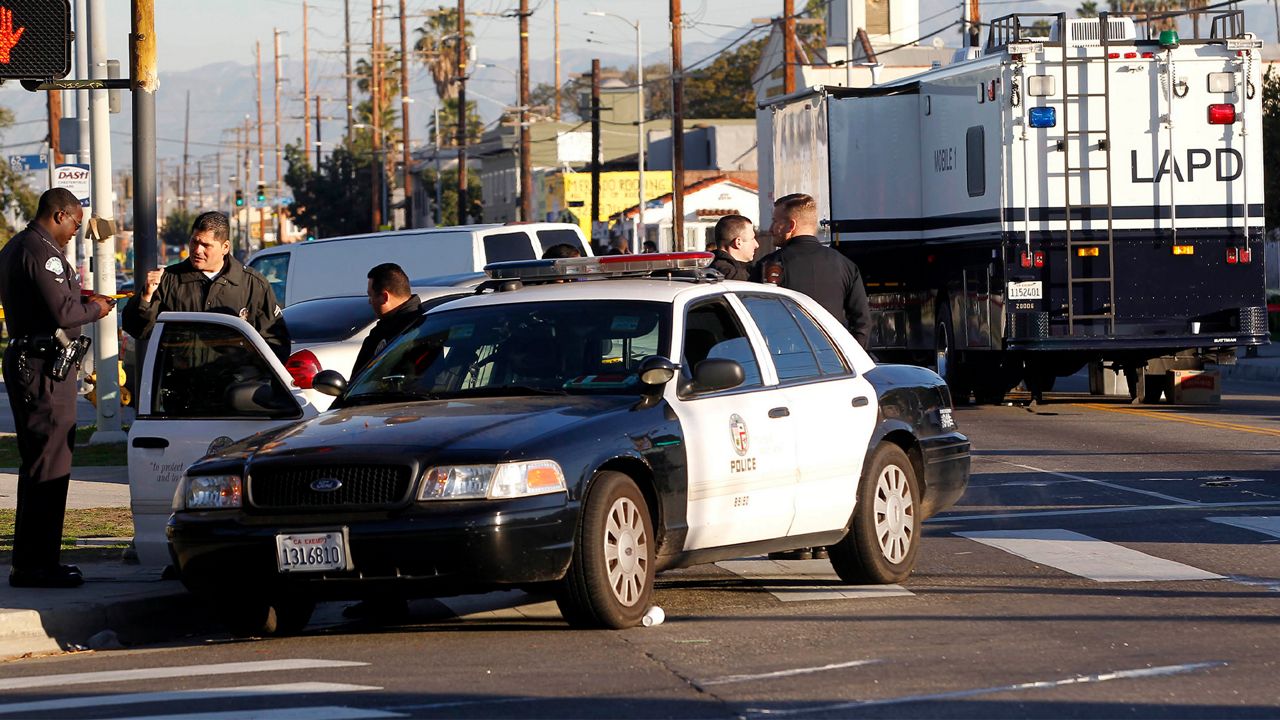LOS ANGELES (CNS) — Five local residents sued the Los Angeles Police Department and its chief early Monday, alleging they were falsely classified by officers as gang members or associates, causing job losses and damage to their reputations.
According to the proposed class action complaint, filed in Los Angeles federal court, LAPD officers "routinely" falsified field interview cards and entered the information into a statewide database.
An LAPD spokesman said the department does not comment on pending litigation.
The suit names three LAPD officers — Braxton Shaw, 37, Michael Coblentz, 43, and Nicolas Martinez, 36 — who were charged last month with conspiracy to obstruct justice and multiple counts of filing a false police report and preparing false documentary evidence.
LAPD Chief Michel Moore subsequently withdrew from the CalGang database program and California Attorney General Xavier Becerra revoked access by any agency to CalGang records generated by the LAPD. Officials said it appears the ripples from the alleged misconduct could upend criminal cases against as many as 750 defendants.
Among the plaintiffs named in the lawsuit is Sara Ochoa, described as a young Latina woman who grew up in East Los Angeles and worked as a correctional officer.
According to the lawsuit, Ochoa held the state job until she became "a victim of LAPD officers" on Jan. 18, when she was misclassified as a gang associate "simply for going back to visit the neighborhood she grew up in."
The suit alleges that not only was Ochoa falsely classified, she was subjected to an "unreasonable detention by being handcuffed on the street in public display" for 20 minutes while her vehicle and belongings were searched.
In another example cited in the complaint, college student Jajuan Johnson alleges he was a passenger in a car when LAPD officers initiated a stop, ostensibly for tinted windows, and then "blatantly lied" in a police report contending that the Jamba Juice employee was a gang member.
"The LAPD officers reasoned that because Mr. Johnson's cousin was an alleged gang member, he too must be gang-affiliated," the suit contends. "As a result, Mr. Johnson is currently being prosecuted by the Los Angeles City Attorney's Office pursuant to a fabricated gang allegation."
Although Johnson consistently denied gang membership, and due to the alleged misclassification, the plaintiff lost his job, suffered damage to his reputation, and now deals with "severe depression," the lawsuit alleges. If convicted, he will be required to register as a gang member.
The complaint stems from the "misclassification of hundreds, if not thousands" of Los Angeles residents as gang members by at least 27 officers, including Shaw, Coblentz, and Martinez, according to the document.
"In many instances, LAPD officers falsely stated in official records that the individuals had `self-admitted' gang affiliation when no such admissions had occurred," according to the suit. "This resulted in devastating consequences to putative class members, almost all of whom were Black and Latino, including imprisonment, deprivation of civil rights, and practical consequences such as not being able to obtain a job, rent an apartment, or receive financial aid for college."



